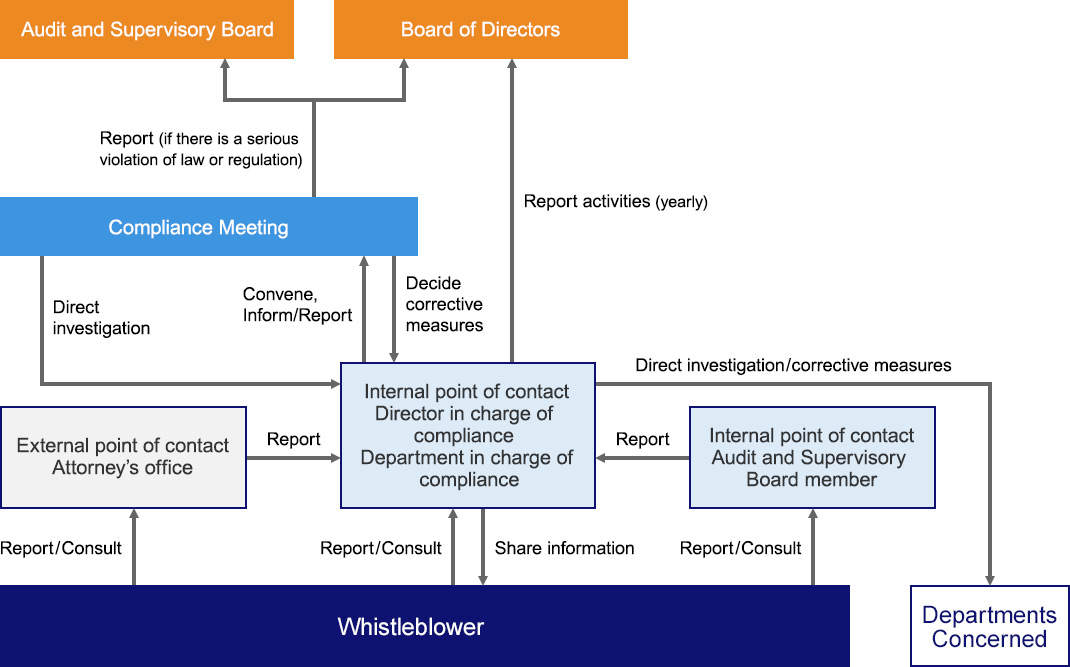Compliance
Compliance policy
Our basic policy of compliance management is that we keep the company and our officers and employees legally safe and secure by preventing their misconduct and negligence. In this respect, we keep reminding our officers and employees of the importance of compliance and put in place and operate a proper mechanism of organizational and procedural preventive measures to ensure compliance in our management and execution of duties.
Compliance structure
We have an officer assigned to the oversight of the company’s risk management and compliance, and the administration of compliance-related affairs is mainly tasked to the department in charge of general affairs. When an issue affecting the company’s overall compliance arises, the department in charge of general affairs will check relevant laws and regulations, put in place necessary internal rules, and keep all related parties informed. If an issue affecting only one or a few specific departments, such as a technical issue, arises, it will be dealt with by the relevant departments. We make a coordinated effort within our organization.
We convene the Risk Management & Compliance Committee, which is chaired by the officer in charge of risk management and compliance, both regularly and in the event that we discover a compliance-related issue, to discuss compliance-related questions and issues and decide on preventive measures, corrective measures, and disciplinary actions.
Compliance education
We provide training for our officers and employees about the basics of compliance and important laws and regulations related to our business when they join the company. We also provide follow-on training regularly through e-learning. In our training, we make sure that the officers and employees understand our corporate philosophy and code of conduct and emphasize the prevention of bribery, compliance with antitrust laws and export control regulations, and information security. We also discuss our whistleblower protection system. Through these efforts, we are increasing the awareness of our officers and employees about the importance of compliance.
Compliance with laws and regulations, and fair trade
In the “Lasertec Code of Conduct”, we set forth our commitment to complying with laws and regulations, articles of incorporation, and social norms, and conducting fair trade and proper business activities.
Prevention of briberies and corruption
- We do not engage in or accept any entertainment or gift giving in violation of relevant laws and regulations in each country or against acceptable business practices and social norms.
- We do not make any political contributions or donations in violation of relevant laws and regulations in each country.
Compliance with anti-trust laws
- We do not engage in any activities that are in violation of antitrust laws in the countries where we operate.
Prevention of tax avoidance, and tax transparency
- We follow the tax laws of the countries where we operate, act in compliance with the OECD’s transfer pricing guidelines and base erosion and profit sharing (BEPS) action plans, and engage in proper tax administration. We will follow the spirit of the law.
- We do not engage in any tax planning that is intended for improper tax evasion and that has no connection with our business operation.
- We make proper disclosures on taxes in compliance with relevant laws and regulations.
Export controls
- We engage in export controls by putting in place “Export Control Regulation” and “Supplement to Export Control Regulation” to maintain international peace and security and to prevent rogue nations and terrorists from gaining access to products and technologies. We comply with export control laws and regulations, including foreign exchange and trade restrictions, by checking the origin of goods being exported, the purpose of trade, and its flow, and judging compliance with regulations. We have an officer assigned to the oversight of national security and export control regulation compliance to ensure that we take necessary measures to maintain and enhance our export control system and comply with export regulations.
Basic principles for exclusion of anti-social forces
Compliance helpline
We have a compliance helpline in place to receive reports and inquiries from the officers and employees of our company and overseas subsidiaries as well as from our business partners concerning human rights violations and other compliance-related issues. A third-party organization serves as the point of contact for the helpline, to which a whistleblower can report their case, either with their name or anonymously, by multiple means of communication. Whistleblowers are protected against any type of unfavorable treatment under our internal rules. We investigate the reported case in accordance with our internal rules, and if we find a violation as a result, we will take necessary corrective and preventive measures.

Ethics and compliance oversight
We have set a basic principle on the institution of an internal control system to put in place a system that ensures the proper operation of our business. The members of the Audit and Supervisory Board are responsible for the oversight and examination of the internal control system pursuant to its audit policy and schedule. They conduct audits in coordination with the Board of Directors and the department in charge of internal auditing.
The department in charge of internal auditing conducts internal audits pursuant to the company’s internal audit rules. The internal audits examine whether the company’s operation follows its rules on compliance, asset management, subsidiary management, and others. These audits are carried out regularly, at least once a year. The results of the audits are reported to the President & Chief Executive Officer and shared with the members of the Audit and Supervisory Board. The department in charge of internal auditing also audits the company’s subsidiaries in the United States, Korea, Taiwan, China, and Singapore every year. For compliance-related internal audits, the department in charge of internal auditing reviews the company’s practices in the areas of labor management, industrial waste disposal, export controls, and others regularly, at least once a year.
